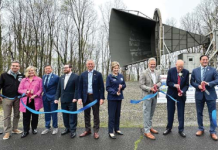By John Burton
MIDDLETOWN – Paul Zigo firmly believes the past is prologue and worthy of our attention and study.
That is especially true for the period in the mid-20th century, dominated by the events of World War II, an area of special interest to Zigo, an associate professor of history at Brookdale Community College who is former director of the college’s Center of World War II Studies and Conflict Resolution.
Zigo, 71, regularly teaches Recent American History, a course that covers the war period, moving forward to more current events. But for Zigo, the passion for much of his life has been concentrating on World War II, which he and many historians see as the defining moment of the last century.
In his course work and continued involvement with the center, Zigo stresses the impact of the war, not just through its battles and combat but also on the home front and the lasting repercussions on geopolitics.
“This is what pushes me into that passion,” Zigo said. “I truly want students to understand the past.”
During his tenure as the center’s director from 2001-2013, Zigo oversaw an annual series of programs and classes that brought together World War II veterans and others who lived through that period or have a special knowledge of it. Those men and women – who were military, civilians, scholars, authors, filmmakers – shared their experiences, giving younger people a living history of the period.
That will be the case Friday, June 6, when Brookdale conducts a 70th anniversary program commemorating D-Day, the Normandy invasion. The program will feature a number of the battle’s veterans.
Zigo recently self-published a book, entitled “The Longest Walk,” detailing the exploits of the U.S. Army 116th Infantry Regiment’s 29th Division from action seen at Normandy’s Omaha Beach on June 6, 1944, to the battle at Saint-Lo in northwestern France in July of that year.
There is urgency in documenting these recollections.
“The thing about World War II, let’s face it, the ‘Greatest Generation’ is phasing out,” aging and passing away, Zigo noted. “It’s so important that we connect while they’re still with us.”
Zigo’s interest in that period grows out of his life.
“I’m a child of that era,” he said.
While his father did not serve in the military during the war, working for RCA – labeled a vital war industry – other family members did.
His interest “came about just by listening” to his relatives and hearing their stories.
It also grew out of his own military experience. As a member of the Army’s Reserve Officers’ Training Corps (ROTC) at Rutgers University, he received a commission as a second lieutenant in 1964 in the regular army. He served in armored units, specializing in tank warfare in Europe and in the U.S.
Zigo eventually left the regular army, but continued in the reserves and National Guard, finally retiring as a “full-bird” colonel.
“The oddity was serving overseas and never seeing combat … But then coming home and being sent to Newark,” where he was born, “for four hellish days” in July 1967 as rioting plagued the city. “I came home and was shot at in my old neighborhood,” he said.
Zigo went on to earn a master’s degree in history at Temple University in Philadelphia. He has been at Brookdale for 37 years, starting out in administration in the office of extension services, and then joining the faculty in 2003. Previously, Zigo worked at what was then Monmouth College, West Long Branch, as director of community relations.
What he hopes students ultimately realize is the significance World War II has had on their lives in so many ways and how it has affected their parents and grandparents.
He asks students to interview older relatives to help them get a sense of “what life was like” during that time.
“It’s all an aside to history,” he said.
What students – and perhaps the population in general – likely don’t realize are things that continue to transpire in parts of the world, including the Middle East and Ukraine, “all stem from this period of time.”
“World War II got us involved in the world” after a period of isolationism, and instilled in the global mindset “our being a superpower, then and after,” he said.
“Many a student does not understand why we live in the world we have today,” he said.
He hopes to give them an appreciation for what went before and how that influences what happens now.
“I’m truly, truly satisfied when I see students walk away and they truly understand,” he said.
Zigo worked with the school officials to establish the World War II center following a trip he took to Normandy and Paris, France, in 2000 with students and others. They visited actual locales and gained an appreciation for the period.
Zigo stepped down as director of the Center of World War II Studies and Conflict Resolution last June when the college leadership decided to change the center’s focus and concentrate more on studying conflict resolution rather than war.
“The thought was it would be of more interest to the current student body and the general public,” he said.
“My belief is the center should retain its original mission.”
Zigo, who has no plans to retire, will continue teaching and is working with the school on the D-Day program and planning for next year’s program, dedicated to the 70th anniversary of the end of World War II.














